Unit 9 Can you come to my party?Section A 1a-3b 知识点串讲课件2022-2023学年人教版英语八年级上册(共13张PPT)
文档属性
| 名称 | Unit 9 Can you come to my party?Section A 1a-3b 知识点串讲课件2022-2023学年人教版英语八年级上册(共13张PPT) |  | |
| 格式 | zip | ||
| 文件大小 | 404.8KB | ||
| 资源类型 | 教案 | ||
| 版本资源 | 人教新目标(Go for it)版 | ||
| 科目 | 英语 | ||
| 更新时间 | 2022-10-10 15:39:02 | ||
图片预览

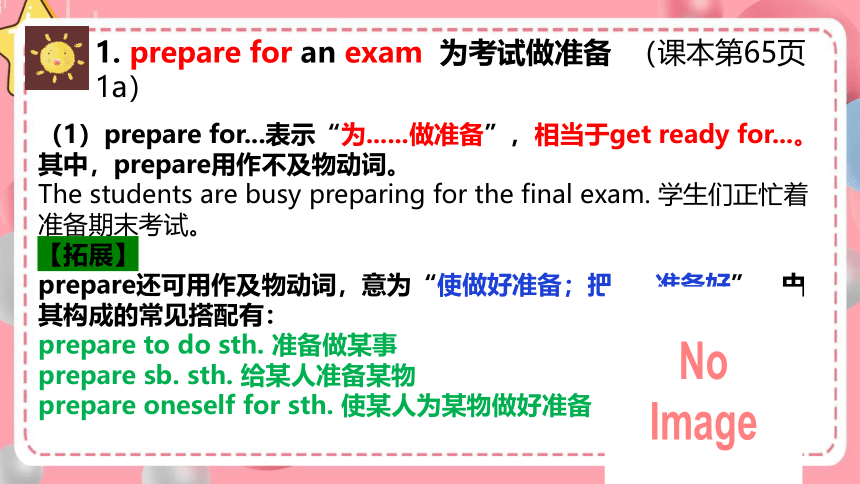
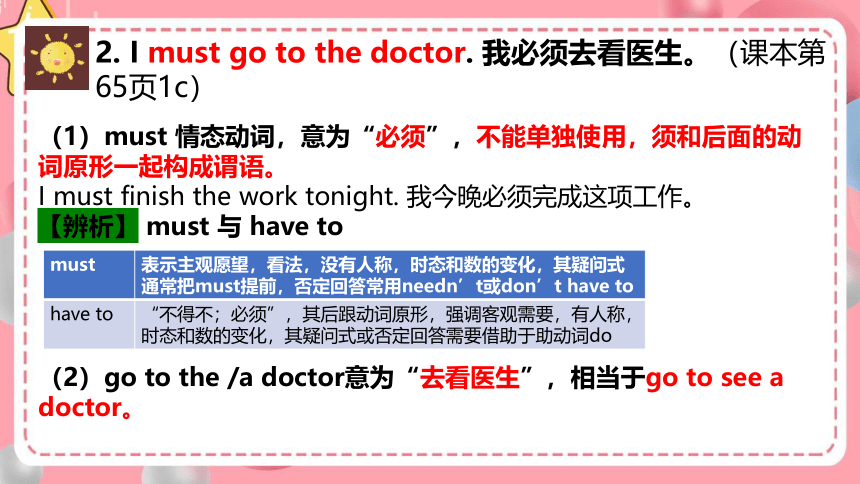
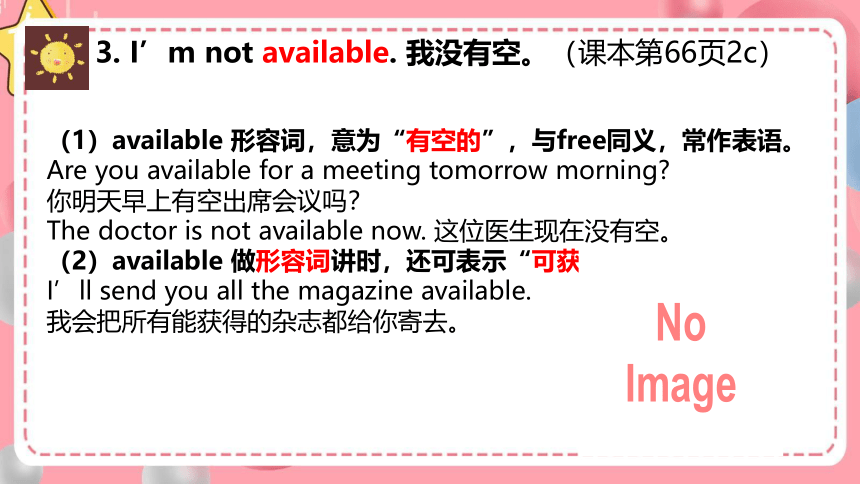
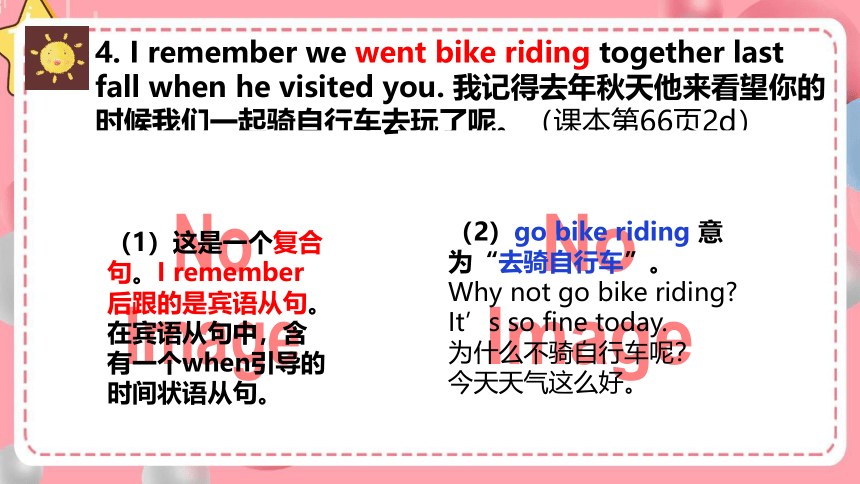
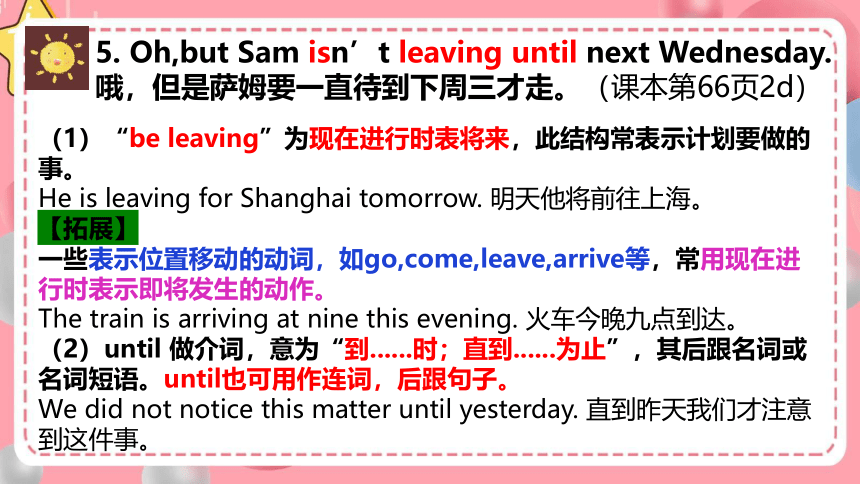
文档简介
(共13张PPT)
Unit9 Can you come to my party
Section A 1a-3b 知识点串讲
1. prepare for an exam 为考试做准备 (课本第65页1a)
(1)prepare for...表示“为......做准备”,相当于get ready for...。其中,prepare用作不及物动词。
The students are busy preparing for the final exam. 学生们正忙着准备期末考试。
【拓展】
prepare还可用作及物动词,意为“使做好准备;把......准备好”,由其构成的常见搭配有:
prepare to do sth. 准备做某事
prepare sb. sth. 给某人准备某物
prepare oneself for sth. 使某人为某物做好准备
2. I must go to the doctor. 我必须去看医生。(课本第65页1c)
(1)must 情态动词,意为“必须”,不能单独使用,须和后面的动词原形一起构成谓语。
I must finish the work tonight. 我今晚必须完成这项工作。
【辨析】 must 与 have to
(2)go to the /a doctor意为“去看医生”,相当于go to see a doctor。
must 表示主观愿望,看法,没有人称,时态和数的变化,其疑问式通常把must提前,否定回答常用needn’t或don’t have to
have to “不得不;必须”,其后跟动词原形,强调客观需要,有人称,时态和数的变化,其疑问式或否定回答需要借助于助动词do
3. I’m not available. 我没有空。(课本第66页2c)
(1)available 形容词,意为“有空的”,与free同义,常作表语。
Are you available for a meeting tomorrow morning
你明天早上有空出席会议吗?
The doctor is not available now. 这位医生现在没有空。
(2)available 做形容词讲时,还可表示“可获得的”。
I’ll send you all the magazine available.
我会把所有能获得的杂志都给你寄去。
4. I remember we went bike riding together last fall when he visited you. 我记得去年秋天他来看望你的时候我们一起骑自行车去玩了呢。(课本第66页2d)
(1)这是一个复合句。I remember后跟的是宾语从句。在宾语从句中,含有一个when引导的时间状语从句。
(2)go bike riding 意为“去骑自行车”。
Why not go bike riding It’s so fine today.
为什么不骑自行车呢? 今天天气这么好。
5. Oh,but Sam isn’t leaving until next Wednesday. 哦,但是萨姆要一直待到下周三才走。(课本第66页2d)
(1)“be leaving”为现在进行时表将来,此结构常表示计划要做的事。
He is leaving for Shanghai tomorrow. 明天他将前往上海。
【拓展】
一些表示位置移动的动词,如go,come,leave,arrive等,常用现在进行时表示即将发生的动作。
The train is arriving at nine this evening. 火车今晚九点到达。
(2)until 做介词,意为“到......时;直到......为止”,其后跟名词或名词短语。until也可用作连词,后跟句子。
We did not notice this matter until yesterday. 直到昨天我们才注意到这件事。
6. Can you hang out with us on Monday night 你周一晚上能和我们一起逛逛吗? (课本第66页2d)
hang out 意为“闲逛;常去某处”。hang作动词,意为“悬挂;垂下”,其过去式为hung。
The local children hang out at the mall all day. 当地的孩子整天在商场闲逛。
Hang your coat up on the hook. 把你的大衣挂在衣钩上。
He hung his head in shame. 他羞愧地低下了头。
【拓展】
hang还可作动词,表示“绞死;吊死”,其过去式为hanged。
7. Catch you on Monday! 周一见! (课本第66页2d)
(1)catch you 常用于口语中,意为“再见”。相当于see you。
I don’t have time to talk with you now. Catch you later! 我现在没有时间与你交谈,以后再谈吧!
(2)catch 作动词,意为“及时赶上;接住;抓住;捉住”。其过去式为caught。
We’re just in time to catch the train.
我们正好能赶上火车。
I caught the ball before it fell on the ground.
我在球落地前接住了它。
How many fish did you catch 你捉到几条鱼?
It’s easy to catch a cold in the winter. 冬天容易患感冒。
8. I have the flu. 我得了流感。 (课本第67页Grammar Focus)
have the flu 意为“得了流感”,相当于get the flu。
John is not well because he has the flu. 约翰身体不舒服,因为他得了流感。
【拓展】have表示“患病”的常用短语
have a cold 感冒
have a toothache 牙疼
have a fever 发烧
have a headache 头疼
9. Inviting 邀请 (课本第67页3b)
invite 及物动词,意为“邀请”。常见用法如下:
①invite sb. to+地点名词 “邀请某人去某地”
②invite sb. to do sth. “邀请某人做某事”
She invited me to her party last week.
上周她邀请我去参加她的聚会。
The man invited Mary to dance with him.
那位男士邀请玛丽和他一起共舞。
【拓展】
invitation是invite的名词形式,意为“邀请;请柬”。
10. Accepting 接受 (课本第67页3b)
accept 动词,意为“接受”。
I can’t accept your advice. 我不能接受你的建议。
【辨析】accept与receive
She received his present,but she will not accept it.
她收到了他的礼物,但她是不会接受的。
accept 意为“接受”,指主观上接受
receive 意为“收到”,强调客观上接到或收到,但主观上不一定接受
11. Refusing 拒绝 (课本第67页3b)
refuse 动词,意为“拒绝”,其后跟名词、代词或动词不定式做宾语。
Why did you refuse his help
你为什么拒绝了他的帮助?
The boy refused to go.
这个男孩不肯去。
Thank you
Unit9 Can you come to my party
Section A 1a-3b 知识点串讲
1. prepare for an exam 为考试做准备 (课本第65页1a)
(1)prepare for...表示“为......做准备”,相当于get ready for...。其中,prepare用作不及物动词。
The students are busy preparing for the final exam. 学生们正忙着准备期末考试。
【拓展】
prepare还可用作及物动词,意为“使做好准备;把......准备好”,由其构成的常见搭配有:
prepare to do sth. 准备做某事
prepare sb. sth. 给某人准备某物
prepare oneself for sth. 使某人为某物做好准备
2. I must go to the doctor. 我必须去看医生。(课本第65页1c)
(1)must 情态动词,意为“必须”,不能单独使用,须和后面的动词原形一起构成谓语。
I must finish the work tonight. 我今晚必须完成这项工作。
【辨析】 must 与 have to
(2)go to the /a doctor意为“去看医生”,相当于go to see a doctor。
must 表示主观愿望,看法,没有人称,时态和数的变化,其疑问式通常把must提前,否定回答常用needn’t或don’t have to
have to “不得不;必须”,其后跟动词原形,强调客观需要,有人称,时态和数的变化,其疑问式或否定回答需要借助于助动词do
3. I’m not available. 我没有空。(课本第66页2c)
(1)available 形容词,意为“有空的”,与free同义,常作表语。
Are you available for a meeting tomorrow morning
你明天早上有空出席会议吗?
The doctor is not available now. 这位医生现在没有空。
(2)available 做形容词讲时,还可表示“可获得的”。
I’ll send you all the magazine available.
我会把所有能获得的杂志都给你寄去。
4. I remember we went bike riding together last fall when he visited you. 我记得去年秋天他来看望你的时候我们一起骑自行车去玩了呢。(课本第66页2d)
(1)这是一个复合句。I remember后跟的是宾语从句。在宾语从句中,含有一个when引导的时间状语从句。
(2)go bike riding 意为“去骑自行车”。
Why not go bike riding It’s so fine today.
为什么不骑自行车呢? 今天天气这么好。
5. Oh,but Sam isn’t leaving until next Wednesday. 哦,但是萨姆要一直待到下周三才走。(课本第66页2d)
(1)“be leaving”为现在进行时表将来,此结构常表示计划要做的事。
He is leaving for Shanghai tomorrow. 明天他将前往上海。
【拓展】
一些表示位置移动的动词,如go,come,leave,arrive等,常用现在进行时表示即将发生的动作。
The train is arriving at nine this evening. 火车今晚九点到达。
(2)until 做介词,意为“到......时;直到......为止”,其后跟名词或名词短语。until也可用作连词,后跟句子。
We did not notice this matter until yesterday. 直到昨天我们才注意到这件事。
6. Can you hang out with us on Monday night 你周一晚上能和我们一起逛逛吗? (课本第66页2d)
hang out 意为“闲逛;常去某处”。hang作动词,意为“悬挂;垂下”,其过去式为hung。
The local children hang out at the mall all day. 当地的孩子整天在商场闲逛。
Hang your coat up on the hook. 把你的大衣挂在衣钩上。
He hung his head in shame. 他羞愧地低下了头。
【拓展】
hang还可作动词,表示“绞死;吊死”,其过去式为hanged。
7. Catch you on Monday! 周一见! (课本第66页2d)
(1)catch you 常用于口语中,意为“再见”。相当于see you。
I don’t have time to talk with you now. Catch you later! 我现在没有时间与你交谈,以后再谈吧!
(2)catch 作动词,意为“及时赶上;接住;抓住;捉住”。其过去式为caught。
We’re just in time to catch the train.
我们正好能赶上火车。
I caught the ball before it fell on the ground.
我在球落地前接住了它。
How many fish did you catch 你捉到几条鱼?
It’s easy to catch a cold in the winter. 冬天容易患感冒。
8. I have the flu. 我得了流感。 (课本第67页Grammar Focus)
have the flu 意为“得了流感”,相当于get the flu。
John is not well because he has the flu. 约翰身体不舒服,因为他得了流感。
【拓展】have表示“患病”的常用短语
have a cold 感冒
have a toothache 牙疼
have a fever 发烧
have a headache 头疼
9. Inviting 邀请 (课本第67页3b)
invite 及物动词,意为“邀请”。常见用法如下:
①invite sb. to+地点名词 “邀请某人去某地”
②invite sb. to do sth. “邀请某人做某事”
She invited me to her party last week.
上周她邀请我去参加她的聚会。
The man invited Mary to dance with him.
那位男士邀请玛丽和他一起共舞。
【拓展】
invitation是invite的名词形式,意为“邀请;请柬”。
10. Accepting 接受 (课本第67页3b)
accept 动词,意为“接受”。
I can’t accept your advice. 我不能接受你的建议。
【辨析】accept与receive
She received his present,but she will not accept it.
她收到了他的礼物,但她是不会接受的。
accept 意为“接受”,指主观上接受
receive 意为“收到”,强调客观上接到或收到,但主观上不一定接受
11. Refusing 拒绝 (课本第67页3b)
refuse 动词,意为“拒绝”,其后跟名词、代词或动词不定式做宾语。
Why did you refuse his help
你为什么拒绝了他的帮助?
The boy refused to go.
这个男孩不肯去。
Thank you
同课章节目录
- Unit 1 Where did you go on vacation?
- Section A
- Section B
- Unit 2 How often do you exercise?
- Section A
- Section B
- Unit 3 I'm more outgoing than my sister.
- Section A
- Section B
- Unit 4 What's the best movie theater?
- Section A
- Section B
- Unit 5 Do you want to watch a game show?
- Section A
- Section B
- Unit 6 I'm going to study computer science.
- Section A
- Section B
- Unit 7 Will people have robots?
- Section A
- Section B
- Unit 8 How do you make a banana milk shake?
- Section A
- Section B
- Unit 9 Can you come to my party?
- Section A
- Section B
- Unit 10 If you go to the party, you'll have a grea
- Section A
- Section B
